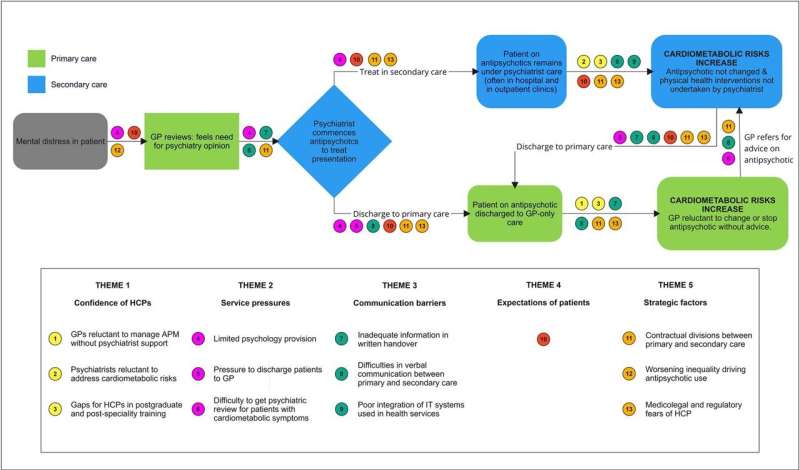This article has been reviewed according to Science X's editorial process and policies. Editors have highlighted the following attributes while ensuring the content's credibility:
fact-checked
peer-reviewed publication
trusted source
proofread
New research urges for policy changes in antipsychotic medication management

Researchers from the University of Liverpool are calling for policy reform in the management of antipsychotic medication (APM) to support both patients and health care professionals.
Along with collaborators at Powys Teaching Health Board, Wales, University of Leeds, and University of Glasgow the new paper identified gaps in care for patients with serious mental illness.
APM is increasingly prescribed to patients with serious mental illness. This increase is due, in part, to fewer side effects including uncontrollable physical movement. However, they can increase risk of obesity and heart disease and so require physical health monitoring. Despite this, many patients prescribed antipsychotics are discharged to primary care without planned psychiatric review.
Published March 1 in PLOS ONE, this the first study in the U.K. to explore the perceptions of General Practitioners (GPs), psychiatrists and managers/directors of policy regarding reasons for increasing prevalence and management of antipsychotics in primary care.
Through interviews, a number of concerns were highlighted by participants. It was found that GPs lacked confidence to manage antipsychotic medications alone and psychiatrists lacked skills to address cardiometabolic risks. Communication barriers were also identified between services. Pressure to discharge from hospital was also reported, resulting in patients in primary care becoming "trapped" on antipsychotics, inhibiting opportunities to deprescribe.
Organizational and contractual barriers between services were also acknowledged with concerns this would exacerbate risk. Concerningly, socioeconomic deprivation and lack of access to non-pharmacological interventions were seen as driving overprescribing. Significantly, professionals voiced fears of criticism if a catastrophic event occurred after stopping an antipsychotic.
Contributing author, Professor Iain Buchan, W.H. Duncan Chair in Public Health Systems and Associate Pro Vice Chancellor for Innovation, University of Liverpool said, "Our research has found that sadly, people prescribed antipsychotic medication experience fragmented, suboptimal care. But there are opportunities to improve care for this population.
"Our paper outlines these suggestions including a hybrid form of contractual shared care for people taking antipsychotics so that they are not left in primary care on these drugs unnecessarily. Changes to Royal College of General Practitioners and Royal College of Psychiatrists curriculum could also be implemented to improve knowledge and skills needed to manage patients on antipsychotics well.
"The University of Liverpool and Mersey Care NHS Foundation Trust recently established the Mental Health Research for Innovation Center (M-RIC) to drive better care in high priority situations such as this. Artificial intelligence (AI) will play an important role in how medicines are prescribed and used in future. We have embedded M-RIC in the new Civic Health Innovation Labs (CHIL), concentrating data scientists and AI engineers on problems such as this."
Following the findings of this paper, further research is planned to take place within CHIL—an interdisciplinary research center tackling global health challenges with civic data and technology. Called the DynAIRx study, it aims to develop new, easy to use, AI tools that support GPs and pharmacists to find patients living with multimorbidity (two or more long-term health conditions) who might be offered a better combination of medicines.
Co-led by Professor Buchan and Dr. Lauren E Walker, DynAIRx focuses on understanding the perspective of patients living with mental and physical health issues, the complex problems they face and exploring the management of antipsychotics.
More information: Alan A. Woodall et al, Management of antipsychotics in primary care: Insights from healthcare professionals and policy makers in the United Kingdom, PLOS ONE (2024). DOI: 10.1371/journal.pone.0294974

















